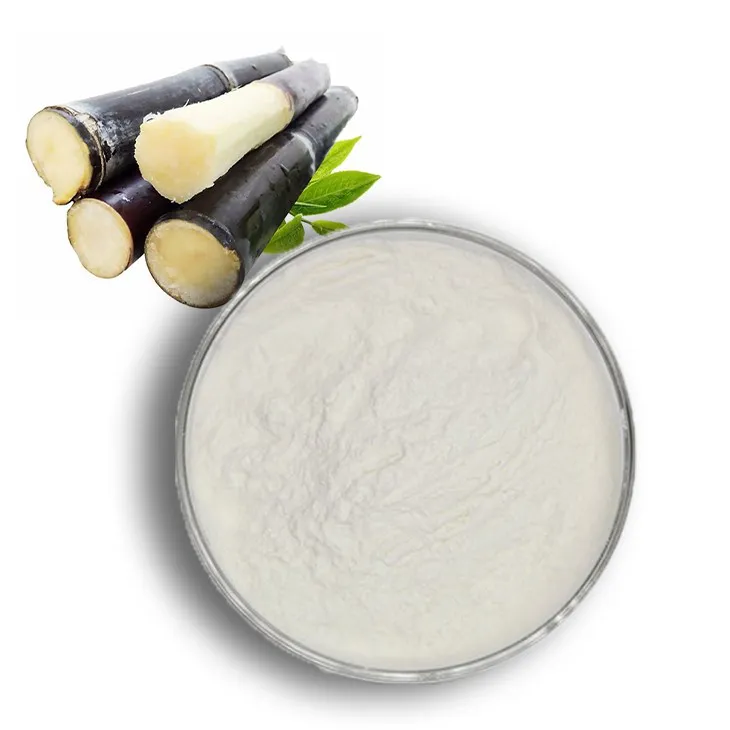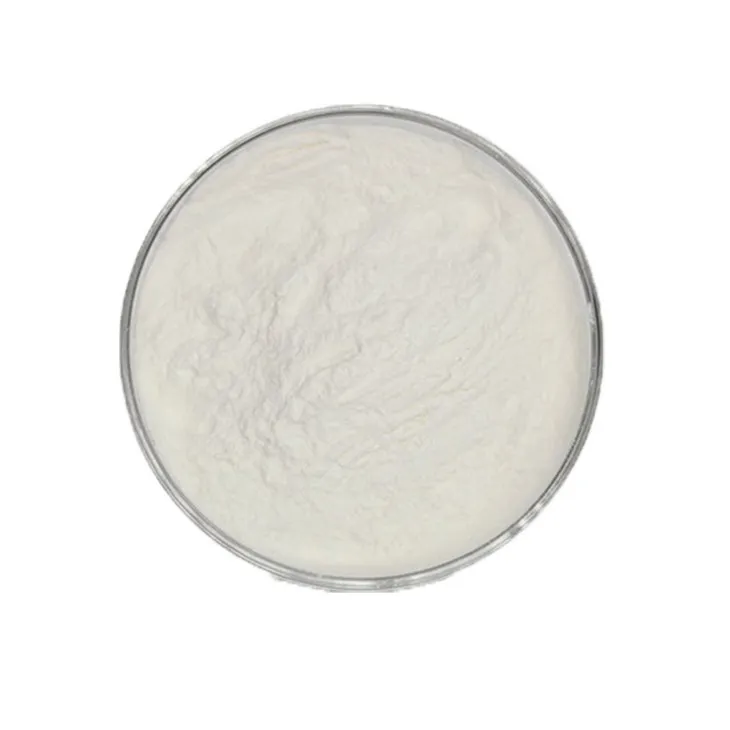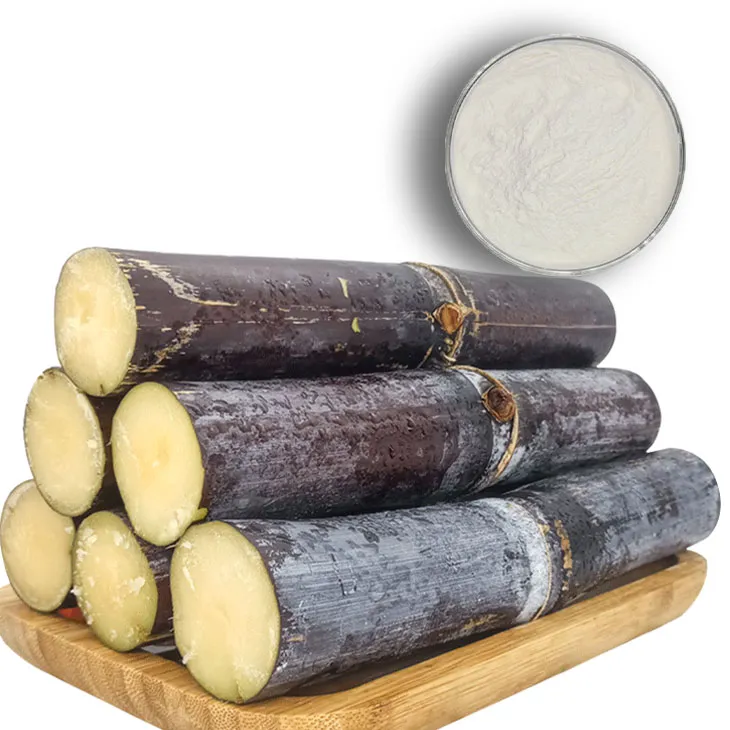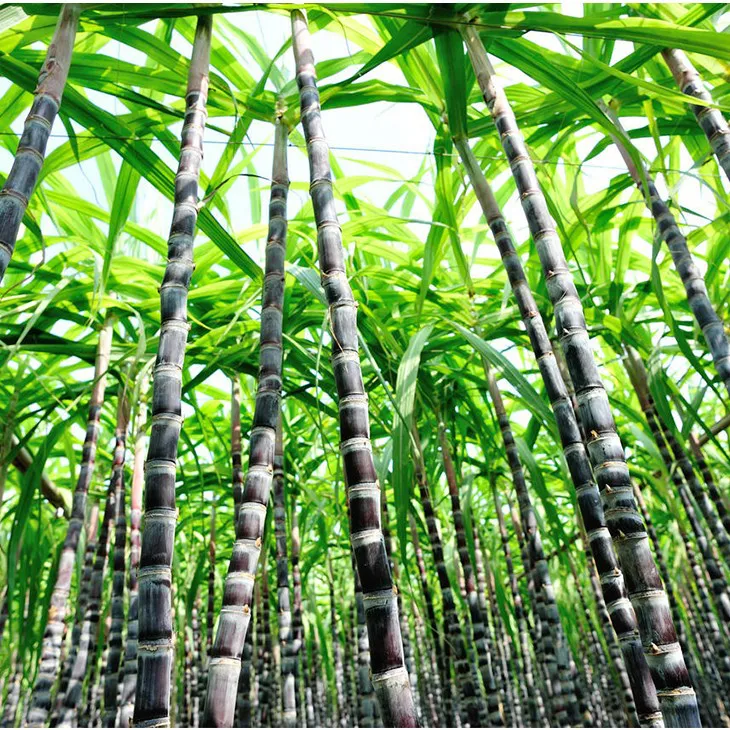- 0086-571-85302990
- sales@greenskybio.com
Best Answers to 7 Key Questions about Sugarcane Extracts
2024-12-16

1. What is Sugarcane Extract?
Sugarcane Extract is a substance obtained from the sugarcane plant (Saccharum officinarum). It is a rich source of various compounds. The extraction process typically involves crushing the sugarcane stalks to obtain the juice, which is then further processed to derive the extract. This extract contains sucrose, which is the main component responsible for the sweet taste. However, it also contains other substances such as minerals (like potassium, calcium, and magnesium), vitamins (such as vitamin C and some B - vitamins in small amounts), and phytonutrients.

2. What are the Composition and Nutritional Profile of Sugarcane Extract?
Composition:
- Sucrose: As mentioned earlier, sucrose is the predominant sugar in sugarcane extract, usually making up a large percentage of its composition. It is a disaccharide composed of glucose and fructose.
- Water: A significant portion of the extract is water, which is essential for its fluidity and also affects its taste and consistency.
- Organic Acids: There are small amounts of organic acids present, such as citric acid and malic acid. These acids contribute to the slightly acidic pH of the extract and can also affect its flavor profile.
- Flavonoids and Phenolic Compounds: These are part of the phytonutrients in sugarcane extract. Flavonoids, for example, have antioxidant properties and can play a role in protecting cells from damage caused by free radicals.
Nutritional Profile:
- Calories: Due to the high sucrose content, sugarcane extract is a calorie - dense substance. Consuming it in large amounts can contribute to increased calorie intake.
- Carbohydrates: Sucrose is a carbohydrate, so sugarcane extract is a significant source of carbohydrates. However, it lacks dietary fiber, which is an important component of a balanced diet.
- Minerals: The presence of minerals like potassium is beneficial for maintaining proper heart function, muscle contractions, and fluid balance in the body. Calcium is important for bone health, and magnesium is involved in various enzymatic reactions.
- Vitamins: Although the vitamin content is relatively low compared to other sources, the small amounts of vitamin C and B - vitamins can still contribute to the overall nutrient intake.

3. How is Sugarcane Extract Used in the Food and Beverage Industry?
In the food and beverage industry, sugarcane extract is widely used.
- Sweeteners: It is a natural source of sweetness and is used as an alternative to artificial sweeteners in many products. For example, in some soft drinks, it provides a more natural and complex flavor compared to synthetic sweeteners.
- Confectionery: In candies, chocolates, and other confectionery items, sugarcane extract is used to add sweetness and improve the texture. It can also contribute to the browning effect during cooking processes in some confections.
- Beverages: Besides soft drinks, it is used in juices, syrups, and alcoholic beverages. In cocktails, it can add a sweet note and enhance the overall flavor profile. In fruit juices, it can adjust the sweetness level and contribute to the mouthfeel.
- Baking: In baking, sugarcane extract is used not only for its sweetening properties but also for its role in promoting yeast fermentation. It helps in the rising of dough and gives a characteristic flavor to baked goods.

4. What are the Potential Health Benefits of Sugarcane Extract?
Despite its high sugar content, sugarcane extract may offer some potential health benefits.
- Antioxidant Activity: The flavonoids and phenolic compounds in sugarcane extract have antioxidant properties. These antioxidants can help neutralize free radicals in the body, which are associated with various diseases such as cancer, heart disease, and aging - related disorders. By reducing oxidative stress, they may contribute to overall health improvement.
- Digestive Health: The small amounts of organic acids present in the extract may aid in digestion. For example, citric acid can stimulate the secretion of digestive juices, which can help break down food more efficiently in the stomach and intestines.
- Hydration: Since a significant portion of sugarcane extract is water, consuming products containing it can contribute to overall hydration. This is especially important for maintaining proper bodily functions, such as circulation, temperature regulation, and nutrient transport.
- Source of Minerals: The minerals present in sugarcane extract, such as potassium, calcium, and magnesium, are essential for various physiological processes. For instance, potassium is crucial for maintaining normal blood pressure levels, and calcium is necessary for strong bones and teeth.

5. Are There Any Risks Associated with Consuming Sugarcane Extract?
While there are potential benefits, there are also some risks associated with consuming sugarcane extract.
- High Sugar Content: The high sucrose content means that excessive consumption can lead to increased blood sugar levels, which is a concern for people with diabetes or those at risk of developing diabetes. It can also contribute to weight gain if not consumed in moderation.
- Tooth Decay: Just like other sugary substances, sugarcane extract can promote tooth decay if proper oral hygiene is not maintained. Bacteria in the mouth can ferment the sugars, producing acids that can erode tooth enamel.
- Allergic Reactions: Although rare, some individuals may be allergic to components in sugarcane extract. Allergic symptoms can range from mild, such as skin rashes or itching, to more severe, such as difficulty breathing or anaphylactic shock in extreme cases.
6. How is Sugarcane Extract Processed?
The processing of sugarcane extract involves several steps:
- Harvesting: Sugarcane is first harvested from the fields. The stalks are cut close to the ground using specialized machinery.
- Cleaning: The harvested stalks are then thoroughly cleaned to remove dirt, leaves, and other debris. This is important to ensure the purity of the final extract.
- Crushing: The clean stalks are passed through crushers to extract the juice. This process breaks down the fibrous structure of the stalks and releases the sugary juice.
- Filtration: The extracted juice is then filtered to remove any remaining solid particles, such as fiber fragments. This results in a clearer juice.
- Concentration: The filtered juice may be concentrated to increase the sugar content. This can be done through evaporation methods, where water is removed from the juice.
- Purification: In some cases, further purification steps may be taken to remove impurities such as non - sugar solids or color - causing compounds. This can involve processes like ion - exchange or activated carbon treatment.
- Final Product Formation: The purified and concentrated extract can then be used as is or further processed into various forms, such as syrups, powders, or granules, depending on the intended use.
7. What is the Future Outlook for Sugarcane Extract in Different Industries?
In the food industry, the demand for natural sweeteners is on the rise. Sugarcane extract, being a natural source of sweetness, is likely to see continued use. There may be more research and development focused on optimizing its use in different food products, such as creating low - calorie or functional food products using sugarcane extract.
In the beverage industry, as consumers become more health - conscious, there may be an increasing interest in using sugarcane extract in combination with other natural ingredients to create healthier beverage options. For example, it could be used in herbal teas or natural energy drinks.
In the cosmetic and skincare industries, the antioxidant properties of sugarcane extract may lead to its increased use. It could be incorporated into creams, lotions, and serums for its potential to protect the skin from oxidative damage and improve skin health.
However, challenges also exist. Sustainability of sugarcane production is a major concern, as large - scale cultivation can have environmental impacts. There may be a need for more sustainable farming practices and improved extraction methods to reduce waste and energy consumption.
FAQ:
Question 1: What is the main composition of sugarcane extracts?
Sugarcane extracts mainly consist of sucrose, which is a type of sugar. Besides, it also contains small amounts of other substances such as glucose, fructose, vitamins (like vitamin C), minerals (such as potassium), and some phenolic compounds. These components can vary depending on the variety of sugarcane and the extraction method used.
Question 2: In which industries are sugarcane extracts widely used?
Sugarcane extracts are widely used in the food and beverage industry. In the food industry, it is a key ingredient in making candies, jams, and baked goods as it provides sweetness. In the beverage industry, it is used in the production of soft drinks, juices, and some alcoholic beverages like rum (which is distilled from sugarcane products). Additionally, it has applications in the cosmetic industry for its moisturizing and antioxidant properties, and in the pharmaceutical industry for certain drug formulations.
Question 3: What are the potential health benefits of sugarcane extracts?
Some potential health benefits of sugarcane extracts include providing a quick source of energy due to its sugar content. The presence of vitamins and minerals can also contribute to overall health. For example, potassium helps in maintaining proper heart function and fluid balance in the body. However, it should be consumed in moderation as excessive sugar intake can lead to health problems such as obesity and diabetes.
Question 4: How is sugarcane extract produced?
The production of sugarcane extract typically involves several steps. First, the sugarcane is harvested. Then it is crushed to extract the juice. The juice is then purified through processes like filtration and clarification to remove impurities such as dirt and fiber. After that, the juice may be concentrated through evaporation to increase the sugar content, resulting in the sugarcane extract. In some cases, further refining steps may be carried out depending on the intended use of the extract.
Question 5: Are there any side effects of consuming sugarcane extracts?
Consuming large amounts of sugarcane extracts can have negative side effects. As mentioned before, due to its high sugar content, it can contribute to weight gain and an increased risk of developing type 2 diabetes. It can also cause dental problems such as cavities if proper oral hygiene is not maintained. Moreover, some people may be allergic to certain components in sugarcane extracts, which can lead to allergic reactions such as skin rashes, itching, or swelling.
Related literature
- The Composition and Properties of Sugarcane Extracts"
- "Sugarcane Extracts in the Food Industry: A Comprehensive Review"
- "Health Implications of Sugarcane Extract Consumption"
- ▶ Hesperidin
- ▶ citrus bioflavonoids
- ▶ plant extract
- ▶ lycopene
- ▶ Diosmin
- ▶ Grape seed extract
- ▶ Sea buckthorn Juice Powder
- ▶ Beetroot powder
- ▶ Hops Extract
- ▶ Artichoke Extract
- ▶ Reishi mushroom extract
- ▶ Astaxanthin
- ▶ Green Tea Extract
- ▶ Curcumin Extract
- ▶ Horse Chestnut Extract
- ▶ Other Problems
- ▶ Boswellia Serrata Extract
- ▶ Resveratrol Extract
- ▶ Marigold Extract
- ▶ Grape Leaf Extract
- ▶ blog3
- ▶ blog4
- ▶ blog5
-
Pure 85% Tomentil Extract.
2024-12-16
-
Soy Extract
2024-12-16
-
Licorice Root Extract Powder
2024-12-16
-
Ginseng Root Extract
2024-12-16
-
Buckthorn bark extract
2024-12-16
-
Pueraria Lobata Extract
2024-12-16
-
Dan Shen Root Extract/Salvia Root Extract
2024-12-16
-
Angelica sinensis extract
2024-12-16
-
Lemon Balm Extract
2024-12-16
-
Phyllanthus Emblica Extract
2024-12-16
-
Senna Leaf Extract
2024-12-16





















